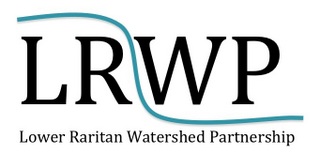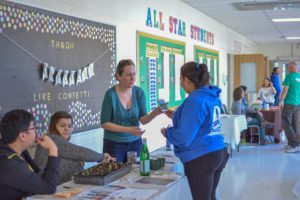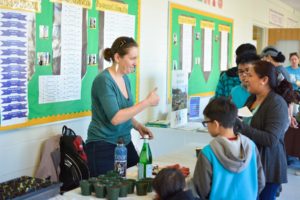The Birds and The Bees
Article by Allie Oross, photos by Johnny Malpica
Rutgers Raritan Scholars Interns Justin So and Allie Oross join New Brunswick Environmental Commission Chair Erin Connolly to hand out milkweed seeds at the New Brunswick Food Forum
On a bright morning at 10 AM in the hallways of A. Chester Redshaw Elementary School, tables from multiple community groups lined the halls in anticipation of the 7th Annual New Brunswick Food Forum organized by the New Brunswick Community Food Alliance (NBCFA). Most of the interest groups were related to food and health within the local community and, as the first visitors started to file in, it was evident that these were topics of both concern and interest. Soon the hallways were bustling with adults and children alike from the surrounding neighborhoods.
The Lower Raritan Watershed Partnership (LRWP) table was promoting the importance of pollinator plants (plants that attract pollinator species) as we handed out milkweed seeds and vegetable seedlings. Children could choose to plant their own milkweed seed at one of our tables and many of them enjoyed the opportunity to get their hands dirty.
Pollinators are animals that assist in the fertilization of plants by transferring pollen from the male anatomy of the flower to the female parts. Pollinators can include bees, butterflies, bats, and birds and are essential for plant biodiversity. The number of pollinators in an area has a direct and positive correlation with the general health of an ecosystem. When these biotic vectors rifle around within the flower looking for nectar, pollen gets stuck to their legs or bodies and when they go to the next flower they take that pollen with them. This allows for diverse genotypes within plant populations that would not be seen without the assistance from pollinators.
The LRWP’s goal in handing out milkweed was not only to encourage an increase in pollinator populations in our urban community, but to also increase public awareness and involvement. We asked that people tend to their milkweed plant and watch it grow for two months, then join us and the New Brunswick Environmental Commission for a “pollinator planting day” on Sunday June 17. At that time the plan is to plant the milkweed seedlings and other pollinator plants in New Brunswick’s Buccleuch Park Pollinator Garden. Though most of the people who visited our table were initially unsure what a pollinator was, many took an interest in the health of our environment and were enthusiastic about the prospect of taking an active role in its prospective remediation.
The ability of our environment to efficiently and cohesively function is of drastic importance to every single person that lives within it. Conveniently enough, that same environmental ability depends mostly on the decisions made and actions taken by our very own species.
As Earth day rolls around, it is vital that we reflect on anthropogenic interference in nature and take responsibility for the consequences of over-development and urbanization. If most of the damage to the planet is caused by humans, then it is a logical conclusion that humans also possess the solution. Events like the Food Forum that engage community education and interaction are integral for the remediation of our planet and decreasing the prevalence of apathy and ignorance within our population.


